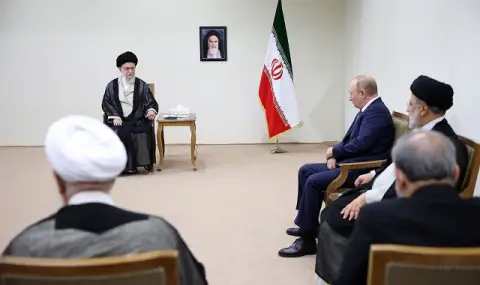In exchange for the supply of ballistic missiles, does it share Is Russia sharing nuclear secrets with Tehran to help it finalize its military program? asks political analyst Isabelle Lasser in an article for the French daily Le Figaro.
In any case, this is exactly what the American and British leaders who met in Washington last Friday fear, according to British sources quoted by the "Guardian". Anthony Blinken, the US secretary of state, issued the same warning three days earlier. "Russia shares technologies that Iran seeks. It's a two-way street, including on nuclear issues as well as space information." However, the suspicions are not new. Russia has already supplied Tehran with S-300 anti-aircraft missiles designed, among other things, to protect Iran's nuclear facilities. Last month, Sergei Shoigu, the secretary of the Russian Security Council close to Vladimir Putin, visited Tehran to consolidate the military partnership between the two countries. The bad news for the West is that Iran, which has been developing its military program since 2002, is now on the nuclear threshold, and the agreement signed in 2015, the JCPOA, is dead and buried. "The development of Iran's ballistic program, which became apparent with the delivery of missiles to Russia, makes things even more complicated," a senior diplomat admitted. This was the main weakness of Iran's nuclear program. But it could be in the process of being filled. Likewise, Russia's knowledge and the input of its specialists would allow Iran to accelerate the process of producing nuclear weapons.
New geopolitical reality
This move, while alarming, is hardly surprising. Since February 2022, the war in Ukraine has united the two partners. Iran supplied Russia with Shahed drones and helped build a drone factory near Moscow. And according to US intelligence, the first batch of high-speed Iranian Fath-360 ballistic missiles with a range of 120 km was recently delivered to Russia. The reality of an alliance between Moscow and Tehran has long been denied by Western experts and diplomats, who emphasized Russia's relative goodwill and cooperation with Western countries to halt Iran's nuclear progress under the JCPOA before Donald Trump unilaterally withdrew from it. Despite the war in Ukraine, Joe Biden was still counting on Russia's support in the summer of 2022 to revive the deal. But this was done to turn a blind eye to the new geopolitical reality that now grips the entire region. Increasingly dependent on Iran to continue its war in Ukraine, the Kremlin has apparently changed its stance on Iran's nuclear power and backed away from pressure. After the war in Ukraine, the terrorist attacks of Hamas against Israel on October 7, 2023 also played a role in the activation of the anti-Western camp. The "Axis of Cataclysm", formed by Russia, China, Iran and North Korea, is increasingly uniting against the West and openly declaring its desire to change the international order shaped by the United States after World War II. "We believe that the era of global dominance by certain powers, including the United States, is over," Iranian President Massoud Pezeshkian said on the sidelines of his meeting with Sergei Shoigu in August.
Iran's nuclear realization
Overlapping security interests between Iran and Russia at the bilateral level now have regional and global implications. Detonation efforts no longer spare nuclear power. After Tehran, where he met the new president, Sergei Shoigu was received by Kim Jong-un to cement the "strategic partnership" with nuclear North Korea. Western diplomats, who have devoted part of their careers to endless negotiations trying to slow Iran's nuclear program, have yet to publicly admit this. But it will soon be too late to prevent Iran from going nuclear. So close to the mark, Iran is no longer interested in negotiating. With the threat of a conflagration in the Middle East looming, he may be betting on future nuclear status to give his allies in the region, particularly Hamas and Hezbollah, a protective umbrella.
The history of recent military interventions, whether in Iraq, Libya or Ukraine, which was not protected by the Budapest Memorandum (1994), which was supposed to guarantee its security in exchange for giving up nuclear weapons, has reminded the vulnerability of non-nuclear countries. The weakening influence of American diplomacy on the international stage before every presidential election, the war in Gaza, as well as the internal problems of major European democracies undoubtedly give Iran new space to push its advantage.
